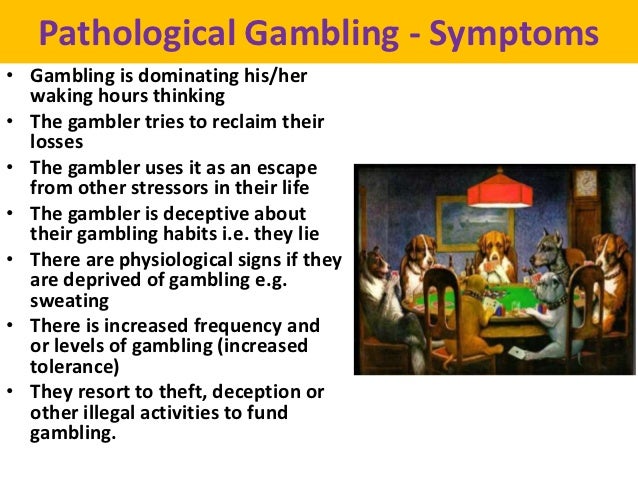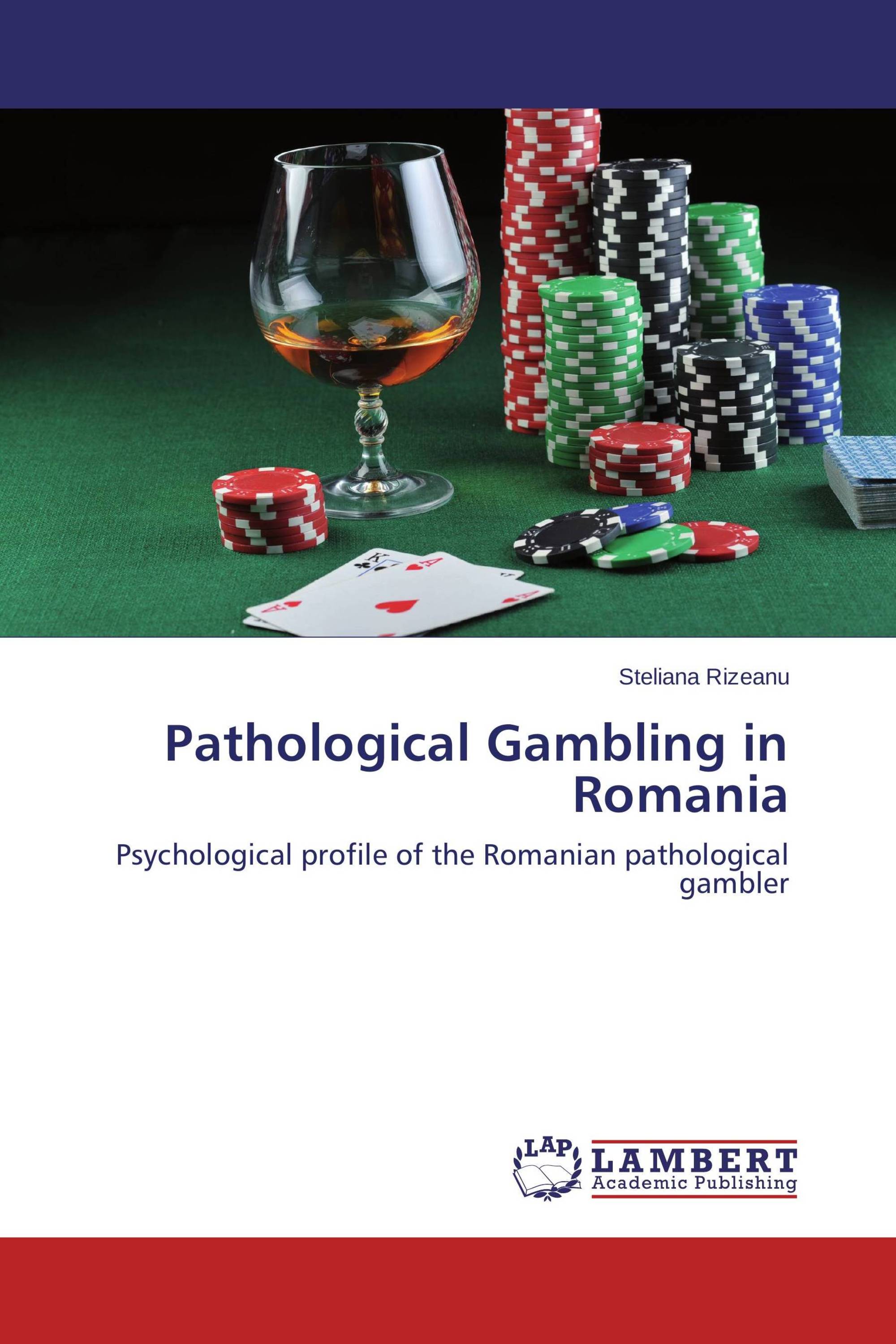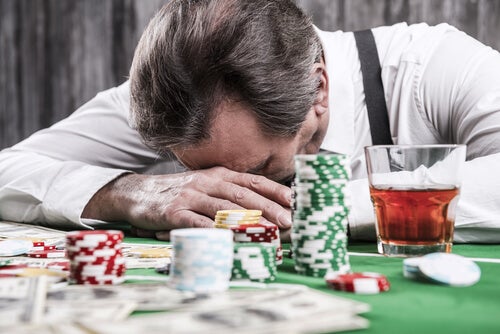Pathological Gambling
Pathological gambling (PG) affects about 0.2-2% of adults and the impact extends to family members, employers and society as a whole. Recent research has identified similarities in the pathophysiologies of PG and substance use disorders (SUDs). As such, findings regarding SUDs provide a framework for investigating PG. Feb 07, 2019 People with pathological gambling behavior often have problems with alcoholand other substances, depression, and anxiety. People with pathological gambling behavior often consider suicide. Pathological gambling has so far received scant attention in the psychiatric literature and this field is still in its infancy. With the deregulation of gambling in the UK, the prevalence of pathological gambling is likely to increase in the coming years.
Gambling addiction, also known as pathological gambling, compulsive gambling, problem gambling, or gambling disorder involves maladaptive patterns of gambling behavior that the individual persists with, despite negative consequences. This is consistent with behavior patterns observed in other addictions.
Pathological Gambling
Gambling addiction, or pathological gambling, has become a significant problem in the United States, impacting teenagers and adults of all ages and their families. Pathological gambling is defined as an urge or addiction to gamble despite harmful or negative consequences or a desire to stop. Due to recent changes in gaming laws, accessibility to gambling has become more widespread, thus increasing the prevalence of gambling related addictions. Previously, legal casinos and sports betting were limited to two states. The widespread growth of riverboat and Native American casinos, state and national lotteries, and easy availability of internet on-line betting has dramatically increased gambling access for everyone, including senior citizens. Older adults are, perhaps, even more vulnerable than other age groups given their greater dependence on fixed incomes and limited ability to recover from large gambling losses.
Gambling is a widespread activity and most people are able to gamble responsibly for enjoyment. However, somewhere between one and five percent of the people who gamble are unable to control their behavior and are considered to have a gambling addiction.
Diagnosis
Pathological gambling is considered a psychiatric disorder in the area of impulse control group and is included in the American Psychological Diagnostic and Statistical Manual (DSM IV) as a recognized disorder when the individual meets at least five of the ten criteria listed below:
The individual is preoccupied with gambling (i.e. preoccupied with reliving past gambling experiences, thinking of ways to get money to gamble or planning their next gambling trip)
The individual needs to gamble with increasing amounts of money in order to achieve the same effect.
The individual has repeated unsuccessful efforts at stopping.
The individual is restless or irritable with attempting to cut down.
The individual gambles as a way of escaping from problems or relieving a dysphoric mood (i.e. feelings of helplessness, guilt, anxiety and depression).
The individual, after losing money gambling, often returns another day to get even (“chasing” one’s losses).
The individual lies to family members, therapist or others to conceal gambling.
The individual has committed illegal acts such as forgery, fraud, theft or embezzlement to finance gambling.
The individual has jeopardized or lost a significant relationship, job, education or career opportunity because of gambling.
The individual relies on others to provide money or relieve a desperate financial situation caused by gambling.
If the answer to any of these questions is “yes”, seeking help from a professional is strongly advised before it can develop into a psychiatric impulse control disorder. A “yes” to just one of these behaviors can spell disaster to the prospect of living a balanced, healthy life. Available research seems to indicate that problem gambling is an internal problem. Problem gamblers will risk money on whatever game is available as opposed to the availability of a particular game in otherwise “normal” individuals. However, research also indicates that pathological gamblers tend
to risk money on fast-paced games. Thus, a problem gambler is much more likely to become addicted to and lose more money on games such as poker, blackjack and slot machines, where rounds end quickly and there is constant temptation to play again or increase bets, as opposed to state lotterieswhere the gambler must wait until the next drawing to see results. In fact, slot machines and video card games have become known as the “crack cocaine” of gambling because of their fast-paced, “bells and whistles” approach which can easily become addictive.

Treatment
Pathological gambling is very similar in definition and symptoms to substance abuse and treatment is often modeled on drug and alcohol treatment models. Treatment generally consists of the use of a 12-step program, behavior modification and counseling, including individual, group and family therapy. Participation in Gambler’s Anonymous programs which advocate abstinence principles and group support has been found to be helpful for some individuals.
Treatment for the person with pathological gambling begins with the recognition of the problem, which can be difficult since the person is often in denial and does not see the reason for treatment or change in their behavior. Most addicted gamblers enter treatment under pressure from others because of relationship, financial or legal difficulties. They may already have accumulated large debts or be facing criminal charges by the time they recognize their need for professional intervention. As with any addiction, recovery takes discipline, self-control and understanding of the reasons for the maladaptive behavior. Pathological gamblers must be committed to make big changes in their lives for treatment to be successful. The chance of relapse with gambling, as with other addictions, is very high given the prevalence and accessibility of gambling whether at a casino or on-line betting.
For further information contact:
Gamblers Anonymous: www.gamblersanonymous.org
National Center for Responsible Gaming: www.ncrg.org
Michigan Department of Community Health website: www.gambleresponsibly.org
Michigan Problem Gambling Helpline: Toll free (800) 270-7117
Local Community Mental Health Center

Written by: Marsha Phillips, M.A., L.P.C.
Reference: Phillips, M. (September 2006). Pathological gambling. Mental Health Matters.
3(11). Gratiot Medical Center: An Affiliate of MidMichigan Health.
Pathological Gambling: Etiology, Comorbidity, and Treatment examines the prevalence and consequences of problem gambling as well as approaches to treatment. In this comprehensive book, Petry clarifies the current understanding of gambling as a disorder, including its levels of intensity; possible origins in biological, neurological, developmental, and environmental spheres; and special issues surrounding populations that seem to be more susceptible to problem gambling, including youth, ethnic minorities, and those with comorbid affective disorders such as depression.
The author reviews treatments commonly used for pathological gambling as well as nonprofessionally guided interventions such as Gamblers Anonymous. Petry then presents her own brief cognitive-behavioral approach, whose success is empirically proven in the largest known study of psychosocial treatments of problem gamblers.
This book represents a review of everything currently known about problem gambling as well as promising treatment approaches, making it an invaluable, comprehensive resource for both therapists and researchers in the field of pathological gambling.
Acknowledgments
I. Foundations for Understanding
- Introduction
- Terminology, Prevalence Rates, and Types of Gambling
- Assessment
II. Etiology
- Demographic Correlates
- Comorbidity of Disordered Gambling and Other Psychiatric Disorders
- Neurobiology and Genetics

III. Research on Interventions
Pathological Gambling Definition

- Pharmacotherapies
- Recovery Without Professional Intervention
- Therapy for Families and Significant Others
- Psychoanalytic and Psychodynamic Treatments
- Early Behavioral Treatments
- Cognitive Biases and Cognitive Therapy
IV. A Treatment Model

- Cognitive–Behavioral Therapy
- Brief and Motivational Interventions
V. Conclusions
- Prevention: Focus on Gambling in Youth and Young Adults
- Conclusions
Appendix A
Appendix B
Appendix C
Appendix D
References
Author Index
Subject Index
About the Author
Nancy M. Petry earned a BA in 1990 from Randolph-Macon Woman's College and a PhD from Harvard University in 1994. In 1996, she joined the faculty of the University of Connecticut Health Center, where she is a professor of psychiatry.
She conducts research on the treatment of addictive disorders, ranging from substance use disorders to pathological gambling, and has published more than 80 peer-reviewed articles. Her work is funded by the National Institute on Drug Abuse, the National Institute of Mental Health, and the National Institute on Alcohol Abuse and Alcoholism.
Dr. Petry serves as a consultant and advisor for the National Institute of Health, and she is on the editorial boards of six academic journals. She received the APA Distinguished Scientific Award for Early Career Contribution to Psychology in 2003.
Choice Outstanding Title!
Pathological Gambling Stats
Anyone with a serious interest in gambling will want this book in their personal library. Now and for the future, this work should remain an indispensable piece of scholarship for those working as researchers and practitioners in this field. Essential.
—CHOICE Magazine